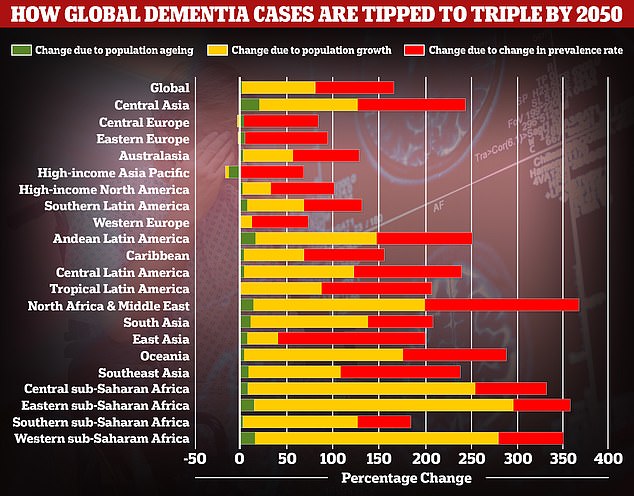The number of people suffering from dementia around the world is set to almost triple over the next three decades.
Experts from the University of Washington expect 153 million people globally to have the condition in 2050, up from around 57million living with dementia now.
The spike will be driven by ageing — the number one risk factor for the disorder — and expanding populations, they say.
For this reason, the biggest rises are expected in developing countries in sub-Saharan Africa, North Africa and the Middle East, where life expectancy is lower than in the West.
Rising rates of obesity, diabetes, smoking and sedentary lifestyles, all of which raise the risk of the disorder, will lead to about 7m diagnoses by 2050.
Alzheimer’s Society estimates 850,000 people in the UK have a form of dementia, the general term for a group of symptoms that are caused by damage to the brain, including memory loss, problems thinking and confusion.
Dementia is the second biggest killer in the UK behind heart disease, according to the UK Government agency, the Office for National Statistics.
In the US, around 5million people have the condition. Alzheimer’s disease is the most common type of dementia, causing up to 70 per cent of cases.

Researchers at the University of Washington School of Medicine found global dementia cases would nearly triple by 2050, from 57.4million to 152.8. But the rate the illness is expected to increase varies between different parts of the world. In Western Europe, cases are expected to rise by just 75 per cent, mainly due to an ageing population, while they are expected to double in North America. But the biggest increase is expected to be seen in North Africa and the Middle East, where cases are projected to rise by 375 per cent

Dementia is a group of symptoms – like memory loss, problems thinking and feeling confused – that are caused by damage to the brain. It mainly affects over-65s and can also cause difficulty understanding and moving
Lead author of the study Emma Nichols, a researcher at presented their findings at Institute for Health Metrics and Evaluation at Washington, presented the findings at the Alzheimer’s Association International Conference in Colorado on Tuesday.
The team based their forecasts on estimates for the current number of dementia cases globally, as well as trends in risk factors for dementia.
Improving air quality could reduce the risk of DEMENTIA: Slashing pollutant levels can lower the chance of developing the condition by 26%, promising study finds
Reducing air pollution could be the key to warding off dementia, according to a promising new analysis of scientific studies being presented today.
Researchers at Chicago-based non-profit Alzheimer’s Association are detailing three papers that put pressure on governments to clean our air and help reduce rates of the debilitating condition.
The study’s authors looked at the effect of reducing nitrogen dioxide (NO2) and particulate matter with a diameter of 2.5 micrometers or less – about 3 per cent the diameter of a human hair – known as PM2.5.
In one study, cutting NO2 levels over time lowered the chance of developing dementia by more than a quarter – up to 26 per cent.
When breathed in, it’s thought microscopic particles in air pollution enter the bloodstream and travel to the brain where they provoke inflammation – a problem that may be the trigger for dementia.
But more research is needed into how exactly air pollution exposure could cause different dementia conditions including Alzheimer’s.
The new analysis is being reported today at the Alzheimer’s Association International Conference (AAIC) 2021, which is being held in Denver and live-streamed online.
Advertisement
The researchers said cases are not expected to rise at the same level in different parts of the world.
For example, cases in Western Europe are expected to rise by just 75 per cent by 2050, mainly due to an ageing population, while they are expected to double in North America.
These regions have lower numbers of population ageing and growth.
In Central and Eastern Europe and Asia-Pacific cases will increase by 60 to 90 per cent, because they are predicted to see booms in population growth in the population in the coming decades.
The biggest sp9ike is expected in North Africa and the Middle East, where cases are projected to rise by 375 per cent, the experts said.
This is due to the fact dementia rates are relatively low compared to other parts of the world, as people only life to their early or mid-70s.
Age is the number one risk factor for the disease and the average patient is diagnosed in their early 80s.
However, researchers expect 6.2million cases of dementia will be prevented due to improved education around health.
This is likely because smoking numbers are decreasing globally and awareness around risks to health are increasing.
Ms Nichols said the calculations will help policymakers better understand expected increases in dementia cases and the drivers of this.
She said: ‘The large anticipated increase in the number of individuals with dementia emphasises the vital need for research focused on the discovery of disease-modifying treatments and effective low-cost interventions for the prevention or delay of dementia onset.’
The research is in line with findings from the WHO, which estimates there to be 50million people with dementia globally and expect cases to reach 82 million in 2030 and 152million by 2050.
Dr Maria Carrillo, chief science officer at the Alzheimer’s Association, said: ‘Improvements in lifestyle in adults in developed countries and other places — including increasing access to education and greater attention to heart health issues — have reduced incidence in recent years, but total numbers with dementia are still going up because of the aging of the population.
‘In addition, obesity, diabetes and sedentary lifestyles in younger people are rising quickly, and these are risk factors for dementia.’
The same researchers recently published a study in the journal Alzheimer’s & Dementia: The Journal of the Alzheimer’s Association, which found that between 1990 and 2019 the rate of people dying from Alzheimer’s increased by 38 per cent.
Dr Carrillo said deaths will continue to rise beyond 2015 unless effective treatments for dementia are identified.
She added: ‘In addition to therapeutics, it’s critical to uncover culturally-tailored interventions that reduce dementia risk through lifestyle factors like education, diet and exercise.’
Separate research from Maastricht University, which was also presented at the conference, estimated there to be 10 new dementia cases per 100,000 people every year in people under 65.
This means around 350,000 people around the world develop early-onset dementia each year, researchers said.
Dr Richard Oakley, head of research at Alzheimer’s Society said: ‘These new figures confirm our fears that many more people around the world are set to experience the heartache of dementia, but there’s hope with decisive action.
‘The UK now has a fantastic opportunity to position itself as a global science superpower and a world leader in revolutionary social care, changing the lives of millions of people affected by dementia.
‘We’ve come so far since our research 30 years ago, which led to the first clinical trials of targeted treatments to slow down Alzheimer’s disease. But there is still a long way to go, and we must attract the best brains in dementia research to the UK to further our understanding in the causes, treatment and prevention of dementia.
‘All this is only possible with a substantial financial commitment. Funding has been hit hard by the pandemic and we urgently need the Government to commit to their promise to double dementia research funding. Research is our only hope to beat dementia.’
Alzheimer’s Research UK said predictions from 2014 estimated that one million Brits will have dementia by 2025, doubling to two million by 2050.
The charity said some UK-focussed research had pointed to a potential drop in the proportion of people living with dementia in any given age group, possibly due to improved levels of education and less smoking.
Hilary Evans, chief executive of the organisation, said: ‘Dementia is our greatest long-term medical challenge. These striking figures (from the latest US research) lay bare the shocking scale of dementia on a global scale.
‘To have 57 million people already living with this devastating condition is 57 million too many, but with that number set to almost triple we need to see concerted global action now, to transform the prospects for the next generation.’
She encouraged people to make ‘positive lifestyle changes’ to ‘help tip the scales in our favour’ when it comes to the chances of developing the condition.
She said: ‘There is robust evidence that what’s good for the heart is also good for the brain.
‘Not smoking, only drinking within the recommended limits, staying mentally and physically active, eating a balanced diet, and keeping blood pressure and cholesterol levels in check can all help to keep our brains healthy as we age.’
It is ‘vital’ that the Government ‘meets the urgent need for investment across every stage of the process’ in the dementia research sector, she added.
Source link : https://www.dailymail.co.uk/news/article-9830591/Dementia-cases-set-triple-worldwide-150-million-2050.html











